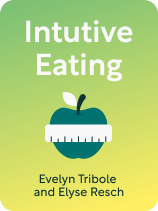

This article is an excerpt from the Shortform book guide to "Intuitive Eating" by Evelyn Tribole and Elyse Resch. Shortform has the world's best summaries and analyses of books you should be reading.
Like this article? Sign up for a free trial here.
What is Intuitive Eating by Evelyn Tribole and Elyse Resch about? Do you want to have a better relationship with food?
Food plays a profound role in our lives by nourishing our bodies, satisfying our cravings, and providing comfort. However, in Western society, the influence of body image ideals pressures us to be thin.
Read below for a brief Intuitive Eating book overview to learn how to overcome food guilt and accept your unique body.
Intuitive Eating by Evelyn Tribole and Elyse Resch
In the Intuitive Eating book (4th edition, 2020), dietician and bestselling author Evelyn Tribole and nutrition therapist and eating disorder specialist Elyse Resch combine their experience helping patients overcome this struggle and cultivate a healthy relationship with food. Their advice—supported by research—is to fulfill your body’s needs by tuning out what others say you should eat and tuning in to what your body wants to eat.
Part 1: How Diets Damage Your Relationship With Food
The pressure to be thin motivates many of us to adopt diets that promise not only to control our weight and improve our health but also to increase our happiness. The underlying implication is that being lean makes us happier by positively affecting our body image, self-esteem, and how others perceive us.
However, Tribole and Resch argue that succumbing to these pressures is often harmful to our physical health, body image, and self-esteem. Why does this happen? According to the authors, it’s because the pressure to adhere to diets gives rise to four negative consequences that damage our relationship with food. These consequences make it challenging to sustain a healthy lifestyle or derive pleasure from what we eat:
- Diets perpetuate harmful body image beliefs.
- Diets increase the risk of weight gain.
- Diets trigger self-judgment and self-blame.
- Diets disrupt bodily awareness and nutritional needs.
Negative Consequence #1: Diets Perpetuate a Harmful Body Image
Diets perpetuate a harmful body image by overemphasizing weight control. Tribole and Resch explain that those living in Western societies are bombarded with weight control advice and advertisements that reinforce the misconception that thinness is the ideal standard of health and beauty.
This pervasive exposure can cause you to overlook the diverse range of body shapes and sizes that naturally exist, making it difficult to accept and embrace the beauty of your unique body. As a result, you may have internalized the belief that you must be thin or toned to be healthy and happy. You also may have experienced pressure to conform to a specific body ideal—such as having a flat stomach.
This pressure may have led you to develop harmful beliefs that prioritize how you look at the expense of your overall well-being. For example, you may believe that you must severely restrict your food intake to attain “the perfect body,” resulting in nutritional deficiencies that compromise your mental and physical health.
Negative Consequence #2: Diets Increase the Risk of Weight Gain
The more you yield to the pressure to control your weight through dieting, the more likely you are to gain weight in the long term. According to Tribole and Resch, this is because diets create a state of deprivation that disrupts your body’s innate ability to maintain a healthy weight.
They explain that all diets restrict food intake, whether by limiting the types of food you eat, the amount of food you consume, or when you can consume food. Each time you restrict your food intake, your body detects a scarcity of food and interprets it as a threat to survival. In response, your body’s survival instinct, designed to safeguard energy reserves during times of famine, slows down your metabolism—meaning it stores more of what you eat as fat. Further, your body compels you to eat more by generating intense cravings that drive you to consume high-calorie foods.
As a result of these cravings, you may find yourself unable to stick to your diet and end up indulging in the very foods you tried to avoid. Or, after successfully completing your diet and achieving your weight goal, you might overeat the reintroduced foods to compensate for missing out on them. In both cases, it’s common to end up weighing more than you did before you started the diet.
For example, following a zero-carb diet triggers cravings for carb-heavy foods. The more you resist these cravings and deprive yourself, the stronger these cravings become. Each time you give in to these cravings, you’re likely to consume more carbs than you would normally eat or that your body needs, resulting in weight gain. Likewise, post-diet, the desire to make up for the carbs you missed out on during the restrictive phase may lead to overindulgence, causing you to consume more calories than your body requires.
Negative Consequence #3: Diets Trigger Self-Judgment and Self-Blame
Though diets often cause weight gain by triggering cravings for forbidden foods, if you fail to control your weight through dieting, you’re more likely to judge and blame yourself rather than question the effectiveness of diets or the societal ideals of the perfect body.
According to Tribole and Resch, this tendency to judge and blame ourselves for a failed diet arises because our culture assigns moral judgments to body types or food choices. You’ve been influenced to associate a slim figure with not only health but also moral qualities and traits such as self-control and beauty. Similarly, diets categorize foods as “good” or “bad,” establishing a dichotomy that implies you’re “good” when you eat the allowed foods and “bad” when you consume the restricted foods. As a result, when you deviate from the prescribed “good” foods, you feel as if you’ve committed a transgression, which results in feelings of guilt, shame, or failure.
Negative Consequence #4: Diets Disrupt Bodily Awareness and Nutritional Needs
Tribole and Resch argue that the combined effect of harmful body image, weight gain from cravings, self-judgment and self-blame disrupts your ability to listen to your body’s cues, preventing you from fulfilling its nutritional needs.
They explain that a negative body image and lack of self-acceptance can make you mistrust your body’s natural signals—because if your body is unacceptable, it can’t be trusted to provide accurate information about what it needs. This mistrust in your body’s signals may lead you to rely on rigid dietary guidelines that emphasize external measures, such as calorie counting or portion control, rather than internal measures such as hunger cues or energy levels.
However, following rigid dietary guidelines disrupts your body’s ability to provide reliable hunger and fullness signals by causing intense cravings for foods that your body doesn’t require, often resulting in episodes of overeating forbidden foods. This can reinforce your inclination to override your body’s cues because it’s telling you to eat foods that don’t support a “good” body image.
Simultaneously, the self-judgment and self-blame triggered by deviating from dietary guidelines add another layer of emotional distress about your eating choices. This emotional distress, combined with intense cravings, initiates another cycle of restrictive eating, further disconnecting you from accurately discerning and responding to your body’s nutritional needs.
As a result, you may find yourself consuming food that doesn’t satisfy you or meet your body’s requirements. This lack of attunement can lead to ongoing struggles with cravings, weight fluctuations, and an overall sense of dissatisfaction with your eating experiences.
Part 2: Promote Food Harmony by Tuning Into Your Body’s Needs
We’ve just explained how following diets can damage your relationship with food, making it difficult to fulfill your body’s nutritional needs and find pleasure in eating. Now, let’s explore an alternative approach to dieting that promotes a healthy relationship with both food and your body.
Tribole and Resch argue that the key to a healthy relationship with food is to promote food harmony: Tune out external influences dictating what you should eat and instead tune in to your body’s cues and cravings. This requires prioritizing internal signals of hunger, fullness, and satisfaction to develop a deeper understanding of your body’s unique nutritional needs and preferences. By embracing this understanding, you can make food choices that align with your body’s requirements, avoid feelings of deprivation, and experience the pleasure that comes from nourishing your body with satisfying foods.
Tribole and Resch suggest four ways to tune in to your body’s needs:
- Stop dieting and accept your unique body.
- Listen to your body’s hunger and fullness cues.
- Prioritize food satisfaction over food morality.
- Find joy in moving your body.
Let’s explore their advice in detail.
Tip #1: Reject Diets and Accept Your Unique Body
The first way to tune in to your body’s needs is to stop dieting and accept your unique body as it is now. This requires letting go of the pressure to conform to a specific body size and instead prioritizing your overall physical, mental, and emotional health.
Because dieting interferes with your internal cues and compels you to focus on external factors like numbers on a weighing scale, Tribole and Resch recommend that you abandon diets and avoid anything that might cause you to fixate on your weight. Here are some ways to achieve this:
- Throw away your scale.
- Delete diet apps and calorie counters, and get rid of dieting books.
- Unfollow influencers who promote dieting.
Tip #2: Listen to Your Body’s Hunger and Fullness Cues
As you work on freeing yourself from the pressure to diet and conform to a specific body size, practice listening to your body’s hunger and fullness cues. Tribole and Resch say that this practice offers multiple benefits: It helps you notice and fulfill your hunger—which, in turn, prevents extreme hunger and curbs intense cravings, and it enables you to satisfy your body’s needs without falling into the trap of overeating.
The authors offer the following advice for tuning in to your body’s hunger and fullness cues:
1) Practice mindful eating by assessing your hunger levels before, during, and after each meal. This allows you to become more aware of how much and how often your body requires nourishment.
2) Pay attention to bodily sensations that indicate hunger, such as a grumbling stomach or low energy levels. When you experience a hunger cue, eat promptly to avoid excessive hunger—being too hungry makes it challenging to discern what food your body needs and when it’s had enough.
3) Ensure easy access to food by preparing meals and snacks in advance. This eliminates feelings of deprivation that trigger overeating because you can confidently stop eating when you’ve had enough, knowing that you can meet your body’s needs whenever hunger arises.
4) Consume food every three to four hours. This practice is particularly beneficial if you’ve lost touch with your body’s natural hunger cues—consistent meal patterns can help your body regain a reliable sense of hunger.
Tip #3: Prioritize Food Satisfaction Over Food Morality
Another essential way to tune into your body’s needs is prioritizing food satisfaction over food morality. This includes rejecting judgments and biases associated with food, focusing on how different foods make your body feel, and giving yourself unconditional permission to eat what you want without feeling guilty.
Tribole and Resch explain that shifting away from food morality helps you avoid the cycle of dieting, intense cravings, indulgence, and guilt. To overcome the cycle of dieting and negative self-judgment, they suggest focusing on how foods nourish and satisfy your body, rather than labeling them as “good” or “bad.” They recommend the following steps for achieving this:
1) List all of the foods that appeal to you and identify those you’ve been judging as “bad.”
2) Eat each of these so-called “bad” foods, paying close attention to how they make you feel physically. For example, you might identify fries as “bad” and note that eating more than a handful satisfies your taste buds but makes you feel bloated and lethargic.
3) Identify any judgments that trigger feelings of guilt or shame associated with eating these foods. For example, you might believe that fries have no nutritional value, leading to a sense of wrongdoing when consuming them.
4) Examine whether your judgments align with your body’s needs. For example, question why you believe fries have no nutritional value, if this belief truly benefits your well-being, and if fries can fulfill your physical needs when eaten in moderation.
5) Give yourself permission to continue eating the foods that make your body feel good, and allow yourself to savor the experience of eating them without guilt or self-judgment.
Tip #4: Find Joy in Moving Your Body
Up until now, we’ve focused on how tuning in to your body helps foster a positive relationship with food. Now, let’s explore how exercise—and finding joy in moving your body—can enhance this relationship.
Regular exercise provides numerous health benefits, such as enhancing mood, boosting energy levels, improving cardiovascular health, and increasing strength and flexibility. However, Tribole and Resch say that when you have an uncomfortable relationship with food, you may also have an uncomfortable relationship with exercise. You might view it as a punishment for eating and feel the need to overcompensate with extra workouts after indulging in treats. This negative association can affect both your relationship with food and your motivation to engage in and benefit from regular exercise.

———End of Preview———
Like what you just read? Read the rest of the world's best book summary and analysis of Evelyn Tribole and Elyse Resch's "Intuitive Eating" at Shortform.
Here's what you'll find in our full Intuitive Eating summary:
- Why eating is often associated with guilt, shame, and fear
- How diets damage your relationship with food
- Ways to cultivate a healthy relationship with food






